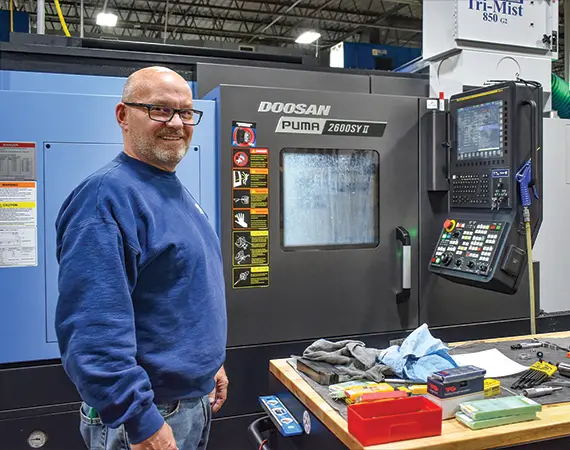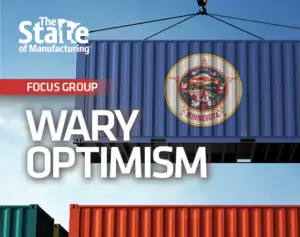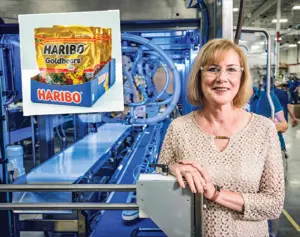Dan Batten believed that his small machining business was missing out on some contracts.
The reason, he explained, was relatively simple: his company, Burnsville, Minn.-based Batten Tool & Machine, was not certified by the International Organization for Standardization (ISO), a Swiss firm that sets forth quality-assurance standards for manufacturing, shipping, food safety, and other industries.
Staff at Batten make custom metal components for companies in the agriculture, military, medical, and chemical industries — valves meant to be installed deep inside an oil well, for instance. A handful of retirements mean six people work there currently, including Batten himself, but they’d typically boast 11-13 employees, he says.
Being understaffed has hampered the company’s production to an extent, Batten says, and they’ve compensated with more capable equipment. Parts that used to require three machines to complete now can be done with a single one.
“Has it hurt our production to lose 50% of our workforce? You bet it did,” Batten says. “But we’re working out of that.”
The company has been in business for almost 30 years, and staff there have long considered it to be largely compliant with “ISO” practices, even if they hadn’t achieved the official certification. Many customers, Batten says, knew the company wasn’t ISO certified but were satisfied with the systems already in place there.
But other potential clients asked, often up-front, for information about the company’s ISO certification, and Batten suspected that lacking it was a hindrance.
When searching for parts for one of its manufacturing processes, for instance, an aerospace company sent a questionnaire that asked about Batten’s ISO bona fides or, in its place, information about similarly-minded processes there. Batten suspects that filling out the information in lieu of the certificate meant his company might not land the job.

“I know for a fact that we’ve missed out on a few opportunities…simply because I couldn’t provide the certificate,” Batten says.
In May 2022, the company contracted with Enterprise Minnesota to pursue ISO certification. Batten earned the distinction in August 2023.
Marty Olson, a business development consultant at Enterprise Minnesota, says the certification could potentially open new opportunities.
“We were able to understand where they were at, what they wanted, and we were able to articulate a clear path to get there,” he says.
James Thomas, an Enterprise Minnesota business growth consultant, worked to get Batten certified. He specializes and understands CNC and lathe, something Batten appreciates.
“We were talking the same language,” Thomas says.
Before they started, Enterprise Minnesota estimated that Batten’s company was already about 70% compliant with ISO standards. Batten and Thomas spent months sorting out changes that staff there would need to make to earn the certificate and determining “key performance indicators” to note if the company is meeting ISO requirements.
“We started with them from scratch,” Thomas says. “How are they capturing customer input? They had to develop a corrective action system. They had to develop how they monitored their suppliers and vendors.”
But ISO certification, Thomas says, doesn’t call for fundamental changes to what a company does. Changes might include monitoring vendors and “capturing” customer satisfaction if staff there weren’t doing so already.
“It’s minor tweaks, rather than change what you do as far as being a company,” he explains.
That means going through each of a company’s key individual processes and determining potential risks, Thomas says. Those risks could range from possible equipment malfunction to a “nonconformance,” or to a problem that might cascade further down the line.
Beforehand, staff at Batten might shop for materials for a job, then order them from a specific vendor via a short email, according to Batten and Thomas. Post-ISO, the company sends more formal purchase orders instead. Staff there have also instituted similar practices for customer complaints, in which they elaborate the root cause of a problem to a customer and how they’ll meet the customer’s needs in the future, according to Thomas. The company also calibrates its inspection equipment more regularly, Batten says, among other changes.
“It is a lot of work. It’s a lot of paperwork. It’s mostly just trying to document our processes and put it in a manual, which we did. I can’t tell you how many hours we had into it. It wasn’t as bad as I thought it was going to be, but it’s still a lot of work, especially for a small company like this,” Batten says. “We were doing things a certain way but weren’t necessarily documenting exactly what we did.”
He says he wasn’t surprised by any aspects of the ISO application process, and that he didn’t find any challenges getting company staff to buy into the idea.
In all, earning the certification cost about $35,000 initially, Batten says, not including staff time. It also costs money to retain the certification, but Batten wasn’t sure how much that would be. The company’s certification arrived in the mail the week of September 22.
ISO certification can sometimes change a company’s management practices, but Batten, who notes that his company was already 70% compliant when it first contracted with Enterprise Minnesota, says the changes haven’t been dramatic.
“The guys know more about how critical it is that they follow up with the correct paperwork, such as inspection reports and stuff like that,” Batten says. “Other than that, it really hasn’t changed a whole lot around here.”
…
Featured story in the Winter 2023 issue of Enterprise Minnesota magazine.


